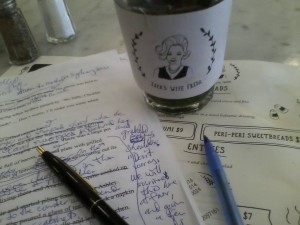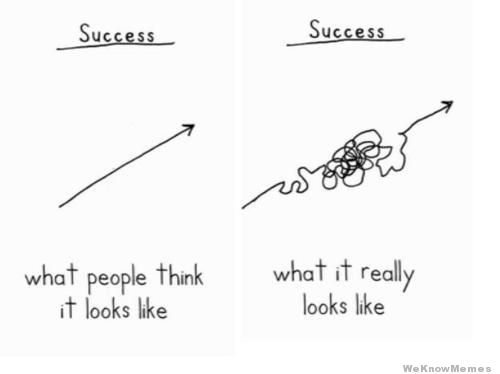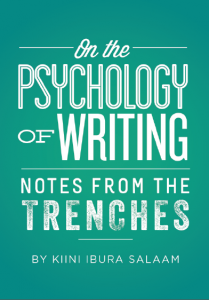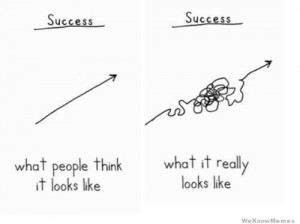From On the Psychology of Writing by Kiini Ibura Salaam
There is a gap between the master artists we want to be and the fledgling artists we are and it will take time, commitment, and patience to traverse that gap.
Artists come to the artmaking process with astounding expectations of themselves. So many of us believe that genius/beauty/mastery should be instant. That if our writing isn’t at the level of a Pulitzer Prize winner then we aren’t “good” writers. But when it comes to artwork, asking “Is my work good enough?” can be a distraction from the more essential question of: “How do I get from here to there?” For mastery is not about innate talent—it’s about committed work over time; it’s about the consistent and persistent development of craft; it’s about daring to create no matter what.
We must dare to make art on our level—no matter how infantile, so that we may grow it up to more mature forms of expression. We must dare to take our ideas seriously—to commit time and effort to pinning them down, developing and revising them, polishing them. We must dare to return to the artmaking process again and again—even when it’s difficult, even when the work doesn’t match our expectations, even when we don’t get published or win awards.
For all those who stand outside the artmaking process, art is equivalent to the outcome. So it’s understandable when artists, too, are fixated on the outcome. Who doesn’t want to create art that is stunning, mind-blowing, life-altering? It is natural to desire accolades and acknowledgement, but the irony is you can’t create genius while fixating on genius. Genius is created by surrendering to the process.
Surrender doesn’t fit neatly into the narrative of “genius,” genius suggests control, confidence, knowledge—mastery. But no one becomes a genius without daring to do the work, without committing to the process and trusting that there will be something worthwhile on the other side. Artmaking is not about having proof of your worth, or proof of your capabilities, or proof of the value of the work you are initiating. It is about doing it anyway. It is about believing that there is something worthwhile about committing to the process. You must believe that, by standing—open and engaged—inside the artistic process, you can create a path for creativity to flower. You must suspend judgment because judging the outcome before the execution is death to the creative process. You must create first, assess later. You must wait and see. You must remain open to the possibility of the process taking you exactly where you thought you’d go—and to the possibility of it taking you in a completely unexpected direction.
And what is process anyway? Process is breaking down a task step by step with the knowledge that each step is but a slim contribution to the end result. Process is going to the grocery store. [Does the food taste good yet? No, the idea is just being cooked up.] Process is selecting the ingredients. [Does the food taste good yet? No, the ingredients are just being identified.] Process is throwing an unplanned item into the bag. [Does the food taste good yet? No, a twist has just introduced itself to the plan. Could it be the key to something genius? Anything is possible.]

At this point in the process, many of us have already stopped. We stand at the beginning of the artist process and try to look ahead to gain proof that our ideas are good enough is to execute. Asking ourselves over and over “Is it any good yet? Is it any good yet?” won’t help us progress through the process. Art doesn’t care if it’s good or bad, it only demands that you stay in the game. (Don’t judge.) That you surrender to the process. (Don’t decide how it should be before it’s done.) That you take EVERY STEP ON THE ROAD. (Don’t stop short before meeting with the twist that’s going to take you higher.) That you don’t leap ahead. (Don’t short-circuit your own creativity) That you have faith that when you open the pot, the food will be cooked.
So much of writing happens in the writing. There are so many ideas we don’t have access to while we’re sitting there trying to come up with good ideas. As we sit down to create art, we stand at the center of numerous whirling spheres of possibility—so many, that we can’t consciously juggle them all. All we can do is be present and express that which is bubbling to the surface. No walking before crawling, no tasting before stirring, no genius without surrender.
Kiini Ibura Salaam is a writer, painter, and traveler from New Orleans, Louisiana. Her short story collection Ancient, Ancient—winner of the 2012 James Tiptree, Jr. award—contains sensual tales of the fantastic, the dark, and the magical. Her Notes From the Trenches ebook series collects essays about the writing life. Her micro-essays on writing can be found at www.kiiniibura.com.



